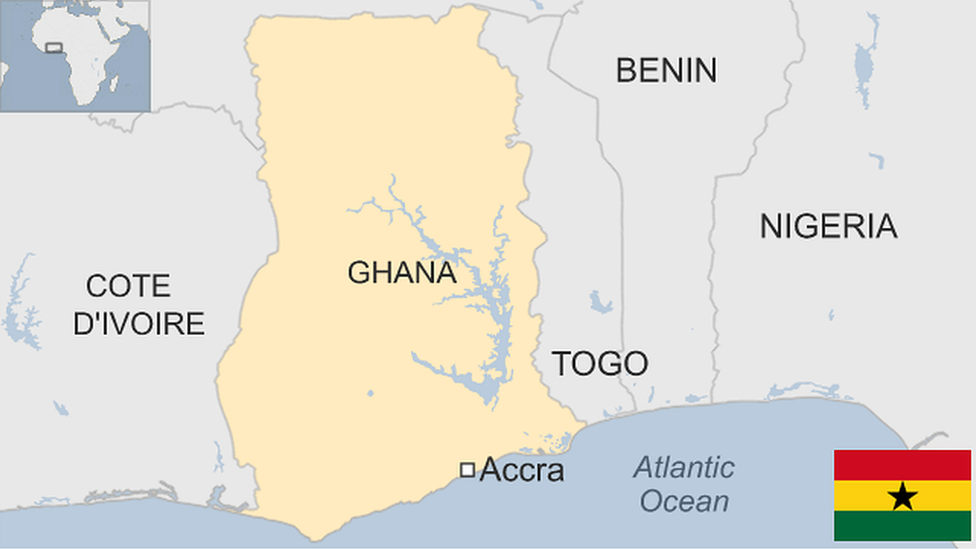Q&A: Ghana presidential and parliamentary election
- Published
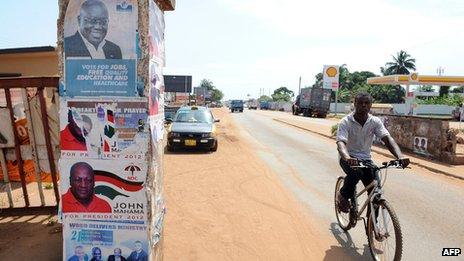
Ghana has been peppered with colourful election posters
Ghanaians go to the polls on 7 December 2012 to elect a new president and parliament, in what the country hopes will confirm its status as a rare beacon of democracy and stability in the region.
Media reports suggest a closely fought contest between John Dramani Mahama, who took over as president after the death of John Atta Mills in July, and Nana Akufo-Addo, the son of a former president.
Since the end of decades of military rule in 1992, Ghana has won praise as a model democracy. It also has one of Africa's fastest growing economies, thanks to its recently tapped oil reserves.
How will the elections work?
The president is elected for a four-year term using a two-round system. A run-off will be held on 28 December if no candidate wins more than 50% of the vote.
Also up for grabs are 275 seats in Ghana's unicameral parliament - up from 230 in previous polls. Members are elected by a simple majority in single-seat constituencies.
About 14 million Ghanaians are registered to vote in the election, which for the first time will use a biometric system to confirm voters' identities. All Ghanaians above 18 years of age are eligible to register.
Who are the main contenders?
There are eight candidates, but only President John Dramani Mahama of the governing National Democratic Congress (NDC) and Nana Addo Dankwa Akufo-Addo of the main opposition New Patriotic Party (NPP) are seen as having a realistic chance of winning.
John Dramani Mahama
President Mahama, 54, is seeking his first full term in office after succeeding President John Atta Mills, having been elected Mr Mills' vice-president in 2009.
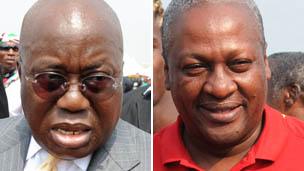
Nana Akufo-Addo (l) is challenging President John Mahama (r)
Campaigning under the slogan "A better Ghana, external", he lists economic growth, better energy supplies, improved access to education and political decentralisation as being among his priorities.
Mr Mahama hails from the Gonja ethnic group in northern Ghana, where he was born in 1958 to a well-off family. His father was a member of parliament. His education included a stint studying in Moscow in the 1980s.
He has published a memoir under the title My First Coup d'Etat, in which he describes his time growing up in post-independence Ghana, including his father's imprisonment during the coup that overthrew independence leader Kwame Nkrumah.
Nana Addo Dankwa Akufo-Addo
Mr Akufo-Addo, 68, narrowly lost the 2008 election to John Atta Mills in the second round, after leading in the first round.
His slogan is "Change Now. Move Ghana Forward", and his manifesto focuses strongly on education, external as a "key to individual and national development".
Known as a champion of free-market economics and liberal democracy, Mr Akufo-Addo promises to kick-start an "industrial revolution", extend coverage by Ghana's National Health Insurance Scheme and fight corruption.
Born to a prominent family in eastern Ghana - his father, Edward Akufo-Addo, was a chief justice and later president of Ghana. Mr Akufo Addo was a founding member of the NPP and served as foreign minister in 2002-7 under President John Kufuor.
What are the main parties?
National Democratic Congress (NDC)
The NDC was formed by Jerry John Rawlings, who was Ghana's military ruler in 1981-92 and then its democratically elected president in 1993-2001.
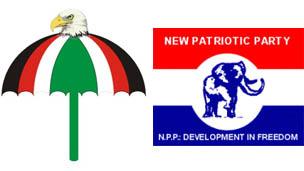
The National Democratic Congress (l) is hoping to keep its advantage over the New Patriotic Party (r)
The party describes itself as social democratic , externaland says it believes in the ''egalitarian treatment of all persons''. In the 2008 elections, NDC won 114 out 230 seats. It uses an umbrella with a eagle's head on top as its party symbol, and red, green, black and white as its colours.
New Patriotic Party (NPP)
The opposition NPP was formed in 1992 by supporters of former Prime Minister Kofi Busia. It has pledged to ''promote a vibrant, free-market economy''. On its website, it says its primary goal to create a "property-owning democracy, external".
Mr Kufuor led the party to victory in the 2000 and 2004 elections. It won 107 seats in 2008. The NPP's symbol is an elephant and its official colours red, white and blue.
What are the main issues?
Ghana became an oil producing country in 2010, and despite initial technical difficulties, the new income source has boosted the economy.
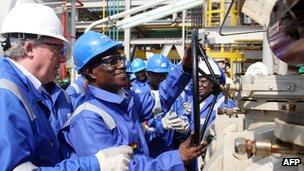
Former President John Atta Mills turned on the oil taps in 2010
But there are fears much of the country's new wealth could be squandered through corruption. The economy has also not remained unscathed by the global economic crisis, with the currency, the cedi, losing 17% against the dollar this year.
The campaign was somewhat overshadowed by speculation about the role of former President Jerry Rawlings, who is seen as seeking to maintain his influence over the NDC.
Last year, Mr Rawlings' wife, Nana Konadu Rawlings, challenged President Mills for the NDC leadership. After losing, she founded a breakaway party that nominated her for the 2012 election, but her presidential bid was barred for procedural reasons.
Will it be free and fair?
The signs are encouraging. The last election, in 2008, passed off peacefully and there were no challenges to the result, despite the very tight second-round margin between winner Mr Mills and Mr Akufo-Addo. The conduct of the vote was widely praised outside Ghana.
The 2012 election will be monitored by observer groups from several Ghanaian and foreign organisations, including the Commonwealth.
Will it be peaceful?
The possibility of election-related violence is seen as low. But there was some concern when in October, a leaked audio tape was broadcast by several radio stations on which leading NDC official Yaw Boateng Gyan allegedly discusses preparations for violence during the election with party activists.
Mr Gyan admits the voice on the tape was his, but insists key passages were doctored. Police say there is nothing on the tape that merited an investigation.
There are also fears that candidates may try to exploit ethnic and regional divisions. Last month, President Mahama told an audience of northern Ghanaians ''not to let this golden opportunity of having one of their own as president of Ghana, slip through their hands''. The opposition said the comments were divisive.
The military has 5,000 soldiers on standby to counter any violence and both candidates have vowed to ensure a peaceful poll.
BBC Monitoring, external reports and analyses news from TV, radio, web and print media around the world. For more reports from BBC Monitoring, click here. You can follow BBC Monitoring on Twitter, external and Facebook, external.
- Published22 November 2012
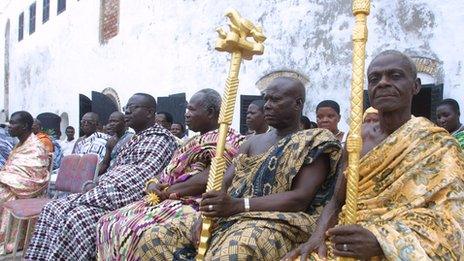
- Published7 January
